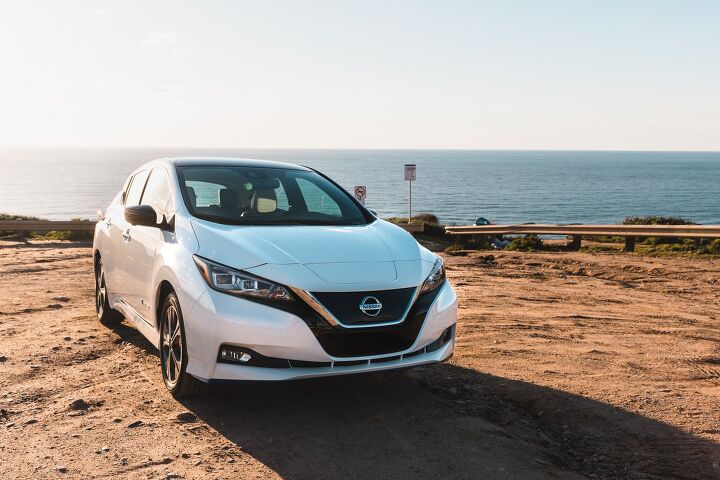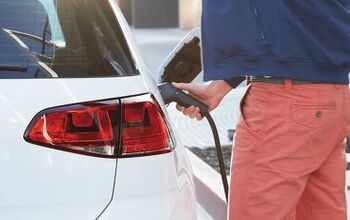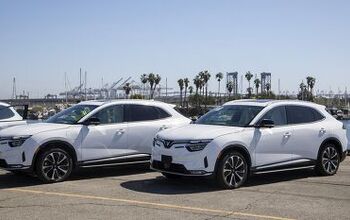Where I Live, Nobody Buys Electric Cars
What does the electric car market look like? And what does the electric car market look like where you live?
Those two closely worded questions may well produce dramatically different answers.
Read enough hot takes on Twitter, unempirical features in tech media, and opinion pieces in the mainstream media and you could be left believing there’s no one left in need of a pickup truck, no one who needs to drive any meaningful distance, no one whose vehicular needs couldn’t be met by a scooter, and certainly no one who wouldn’t be satisfied by a sketchily-built electric car with disappearing doorhandles.
You won’t be surprised to learn that the origins of such beliefs, in part, stem from the locations in which they’re written: San Francisco, Manhattan, and Los Angeles, for example.
But what does the electric car market look like outside of the urban bubble?
It’s not unfair to initially conclude that the overwhelming majority of Americans live in the urban bubble, and that what happens outside of those urban settings is therefore increasingly irrelevant. Yet while it’s true that more than four out of every five Americans live in a so-called urban area, it’s worth noting that the U.S. Census Bureau’s definition of “urban” has evolved over time to include ever smaller areas – called urban clusters – with as few as 2,500 people.
As a result, people who live in Montpelier, Idaho, (pop. 2,597) are classified as urban dwellers. Glasgow, Montana, which is more than a four-hour drive from any significantly populated area (more than 75,000 people) and has a population of only 3,250, is also classified as an urban area.
Tucked away in census data is the fact that 42.2 million people live in completely rural or mostly rural counties. Those are the kinds of counties where your food is grown.
It’s impossible to know precisely what the current state of transportation looks like in each of those areas, let alone what the future of transportation will look like. I am, however, in possession of a wide variety of data points that show what the new vehicle market looks like in one small area that looks an awful lot like non-urban America.
Granted, you’ll have to insert a gigantic asterisk. The area in question is north of the border. Prince Edward Island, home to 153,244 people spread across 2,185 square miles, was the fastest-growing province in Canada last year. Here’s PEI-specific EV-related info.
- There are no EV tax rebates in place.
- There are 38 public charging stations, plus a handful under construction.
- A Chevrolet Bolt could travel from the far west in Tignish to the far east in Souris and still have over 60 miles of range remaining.
- On very rare occasions, there’s been enough wind power generated in PEI to exceed the electrical demand of the province.
- Weekly wages are the lowest in the country.
- The only two significant population centers, greater Charlottetown and Summerside, claim roughly 50,000 and 15,000 residents, respectively, leaving the majority of the province in decidedly rural settings or in towns and villages with fewer than 2,000 people.
- The average January low temperature is 10°F; average daily highs are at or below freezing in December, January, and February, and March.
- 1 out of every 23 residents purchased/leased a new vehicle in 2018.
- For every 731 conventionally-powered vehicles registered in PEI in 2018, there was 1 electric car registered.
UNPLUGGED
That’s 9 EVs in total: a pair of Bolts, a trio of Leafs, and a Tesla quartet.
That’s 0.14 percent of the market, compared with roughly 1 percent nationally.
There’s no denying this local market diverges from the norm in many ways, not just when it comes to EV uptake.
Premium brands, with essentially no dealer representation, own less than 2 percent of the PEI market, compared with 12 percent nationally.
Pickup trucks earn 19 percent of PEI auto sales, comparable with national figures, but all of them – including the Ford F-Series, Ram P/U, and GM twins that top Canadian sales charts – are outsold by the Honda Civic and Toyota Corolla in PEI.
Ford, which is Canada’s top-selling auto brand, ranks a distant fifth here.
And hybrids also endure a high level of rejection on the Island. Together, hybrids and plug-in hybrids collect only 0.6 percent of all Island auto sales. Only 2 percent of the Toyotas registered in PEI, for instance, were hybrids, compared with 10 percent nationally.
This specific market, surely like countless other small, rural markets across North America, is distinct.
Yes, its overarching tendencies are largely in line with the preferences of the continent: more SUVs and crossovers, demand for pickups remains high, lingering passenger car demand is shifting with greater frequency to consistently dominant nameplates. But it also appears as though this local market’s unwillingness to participate in the EV market is as much related to pragmatism and cost-conscious mindsets as it is to anecdotal concerns about driving into a muddy potato field or heading to the mainland for the weekend.
The 10 best-selling non-pickup trucks own one-third of the overall PEI market and have an average base MSRP under CAD $23,000. Before perceived and actual limitations are even factored in, the Bolt, Leaf Plus, and Model 3 are all around twice as costly.
That’s a tough dollars-and-cents argument for an electric car advocate to win.
[Images: Nissan, General Motors, Tesla, Tim Cain/TTAC]
Timothy Cain is a contributing analyst at The Truth About Cars and Driving.ca and the founder and former editor of GoodCarBadCar.net. Follow on Twitter @timcaincars and Instagram.
More by Timothy Cain
Latest Car Reviews
Read moreLatest Product Reviews
Read moreRecent Comments
- V8fairy Not scared, but I would be reluctant to put my trust in it. The technology is just not quite there yet
- V8fairy Headlights that switch on/off with the ignition - similar to the requirement that Sweden has- lights must run any time the car is on.Definitely knobs and buttons, touchscreens should only be for navigation and phone mirroring and configuration of non essential items like stereo balance/ fade etc>Bagpipes for following too close.A following distance warning system - I'd be happy to see made mandatory. And bagpipes would be a good choice for this, so hard to put up with!ABS probably should be a mandatory requirementI personally would like to have blind spot monitoring, although should absolutely NOT be mandatory. Is there a blind spot monitoring kit that could be rerofitted to a 1980 Cadillac?
- IBx1 A manual transmission
- Bd2 All these inane posts (often referencing Hyundai, Kia) the past week are by "Anal" who has been using my handle, so just ignore them...
- 3-On-The-Tree I was disappointed that when I bought my 2002 Suzuki GSX1300R that the Europeans put a mandatory speed limiter on it from 197mph down to 186mph for the 2002 year U.S models.





































Comments
Join the conversation
EV cult is just another enviro-cult. When these cars make sense, you don't have to convince anyone or prime the market. People can figure this out for themselves. Envirocultists believe they are smart and people who disagree are stupid, so they offer carrots and sticks and eventually, when that doesn't work, just sticks. Same old story. Clean air and water were never going to be enough. It never ends.
I'm a car guy, own 7 no EV. But for the road a tesla is simple great to drive, I still think an AMG mercdes e63 wagon is better all around for the same money, but the immediate and seemingly unlimited response of a tesla is great. So I can see one day electrics being mainstream. However without getting into costs, which may one day reach parity there are a number of otehr BIG questions, today. Lets look at a number of current issues. I went shopping for my wifes next car, we serioulsy shopped the Jaguar EV. Cost is realisticaly 30-40% more than a ice equivalet vehicle of the same capacity, I was prepared to overlook that. But real range is a real factor. Firstly you cant really use the last 20% of range without fear of cooking the batteries, and you cant fast charge past 80% for the same reason. If you need heat in winter that dings range too. Realisticaly that 240 mile range is 160-180. You also need to install a home charger which is not free, and somewhere sometime after youre sure youre finished driving plug the car in. Realisticay any type of distance travel is going to be By Ice. The BIG ISSUE no one is touching is enviromental. Makign batteries and elctric cars is an epic and I mean epic enviromental disaster already. Thats before you get into the absence of any battery disposal plan or slave labor for colbalt etc. What elctric already offer is better on road performance in terms of throttle response, virtue signalling, avoidance of gas stations, and heres the BG one, Urban elites can move exhaust pollution out of their cities. The price were going to pay for moving exhuast pollution out of cities is an eviromental disaster beyond imagination. Hell we can't even dispose of computers in an eviromentaly friendly manner yet, were just exporting toxic computer waste to Africa. if everyone drove electric, or even 50% did we would literaly be poisoning the planet. Yeah I look forwards to a battery world. No noisy lawnmowrs or leaf blower disturbing my suburban bliss. No loud cars going down the road and yes cleaner air. But if its about the enviroment then I want a comprehensive plan. I wnat to know the enery and enviromental input rewquired to build my elctric, and I want to know that all that poisonous crap in the battery can and will be taken care of in envirometaly sound manner when the car is done. So far no ones talking about the big enviromental issues with elctrics, if they really care they should. Yeah I love my ICE sportscars, and yes for the road a tesla roadster with unlimted power sounds great. But so far if you look at the whole picture electrics are a niche, and so far what they offer is an improvenmt of elite urban air at vast cost to all types of other people all over the globe. Before I abadon ICE and adopt the new messiah I want to see the whole picture, not just the promise of salvation.